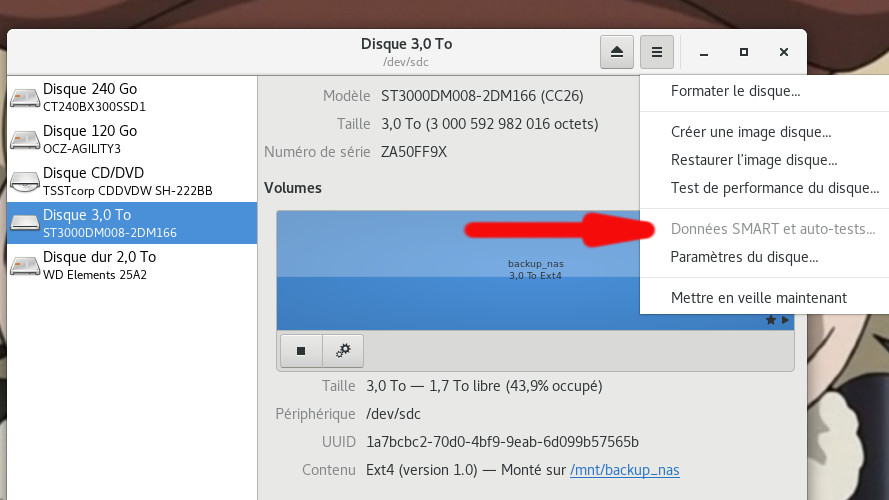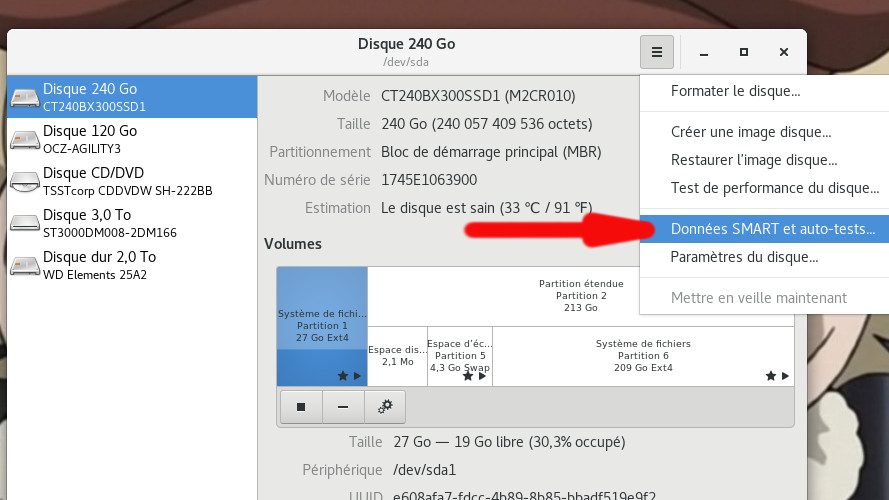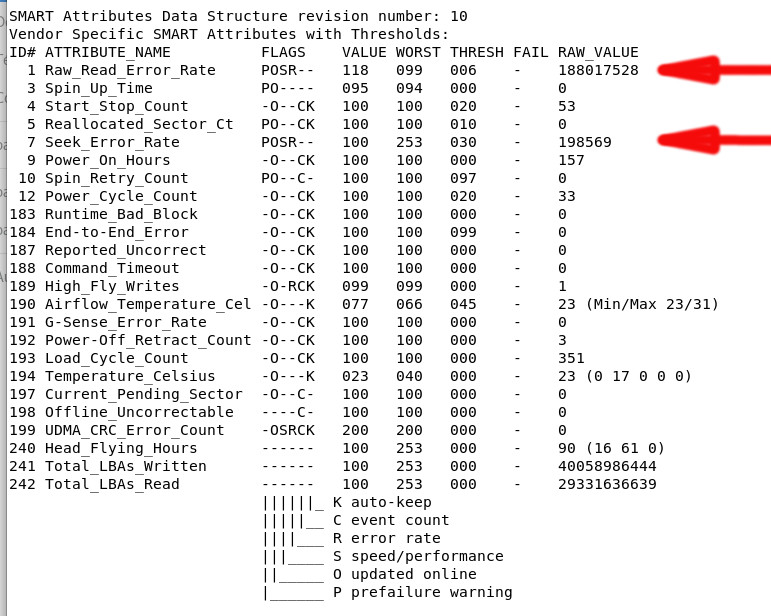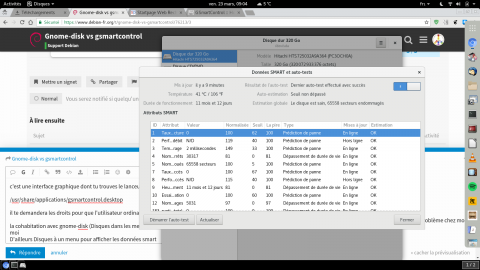Bonjour
D’habitude pour contrôler un hdd, je regarde simplement les données smart de gnome-disk, “le disque est sain”… super. Mais suite à des doutes sur l’état d’un nouveau hdd pour mes sauvegardes, j’ai essayé gsmartcontrol. Très mauvaise idée, le soft donne de bons résultats, mais maintenant je ne peux plus utiliser gnome-disk (même en root), seulement pour ce disque, mes deux ssd (non testé avec gsmartcontrol) sont toujours compatibles avec gnome-disk. J’ai essayé avec une debian toute neuve, même topo?
Le SAV seagate n’acceptant que leurs outils de diagnostiques, j’ai donc testé sous windows, et là c’est normal.
J’ai un peu de mal à comprendre le truc, on dirait que le fait de devoir faire le test (gsmartcontrol) en root, verrouille l’accès aux données smart en “dur” sur le hdd.
Bonne journée
Bertrand
Et donc sur quoi on peut aider, tu veux faire quoi ?
Bonjour,
Bon et bien alors tout va bien…
Peut-être qu’il suffit de désinstaller gsmartcontrolpour que gnome-disk fonctionne à nouveau…
gsmartcontrol ne s’utilise pas directement en root
c’est une interface graphique dont tu trouves le lanceur dans les menus
/usr/share/applications/gsmartcontrol.desktop
il te demandera les droits pour que l’utilisateur ordinaire puisse l’utiliser
la cohabitation avec gnome-disk (Disques dans les menus) ne pose aucun problème chez moi
D’ailleurs Disques à un menu pour afficher les données smart
Et bien , ce disque doit finir dans mon nas (openmediavault) et j’aimerais simplement pouvoir contrôler son état de santé. 

Et ça fait la même chose si je lance gnome-disk en root.
Et pour répondre à la question le disque est-il sain, normalement, c’est ces deux valeurs qui m’interpelle.

Pour un hdd de trois semaines je trouve ça inquiétant, surtout pour sauvegarder.
Bertrand
Pour le disque en sdc qui semble être un Seagate
que dit
smartctl -i /dev/sdc
pour activer smart c’est a priori si je comprends bien https://linux.die.net/man/8/smartctl
smartctl -s on /dev/sdc
Pour interpreter les résultats
https://lime-technology.com/wiki/Understanding_SMART_Reports
Mais ça peut dépendre du fabricant du disque qui peut ne pas fournir des infos cohérentes et il faut donc aller à la pêche avec nom de l’attribut ( raw_read_error_rate) et le modele du disque
pour tester en ligne de commande
smartctl -x /dev/sda
j’obtiens
ID# ATTRIBUTE_NAME FLAGS VALUE WORST THRESH FAIL RAW_VALUE
1 Raw_Read_Error_Rate POSR-K 100 100 062 - 0
7 Seek_Error_Rate POSR-K 100 100 067 - 0
c’est sensé representer un taux donc je ne vois pas comment ça peut dépasser 100%
voir ici
https://kb.acronis.com/content/9264
et
https://lime-technology.com/wiki/Understanding_SMART_Reports
[bertrand@poste01 ~]$ smartctl -i /dev/sdc
smartctl 6.5 2016-05-07 r4318 [x86_64-linux-4.15.10-300.fc27.x86_64] (local build)
Copyright (C) 2002-16, Bruce Allen, Christian Franke, www.smartmontools.org
Smartctl open device: /dev/sdc failed: Permission denied
[bertrand@poste01 ~]$
[bertrand@poste01 ~]$ su
Mot de passe :
[root@poste01 bertrand]#
[root@poste01 bertrand]# smartctl -i /dev/sdc
smartctl 6.5 2016-05-07 r4318 [x86_64-linux-4.15.10-300.fc27.x86_64] (local build)
Copyright (C) 2002-16, Bruce Allen, Christian Franke, www.smartmontools.org
=== START OF INFORMATION SECTION ===
Device Model: ST3000DM008-2DM166
Serial Number: ZA50FF9X
LU WWN Device Id: 5 000c50 0a55d9f6d
Firmware Version: CC26
User Capacity: 3 000 592 982 016 bytes [3,00 TB]
Sector Sizes: 512 bytes logical, 4096 bytes physical
Rotation Rate: 7200 rpm
Form Factor: 3.5 inches
Device is: Not in smartctl database [for details use: -P showall]
ATA Version is: ACS-2, ACS-3 T13/2161-D revision 3b
SATA Version is: SATA 3.1, 6.0 Gb/s (current: 6.0 Gb/s)
Local Time is: Fri Mar 23 17:32:46 2018 CET
SMART support is: Available - device has SMART capability.
SMART support is: Enabled
[root@poste01 bertrand]#
[root@poste01 bertrand]# smartctl -x /dev/sdc
smartctl 6.5 2016-05-07 r4318 [x86_64-linux-4.15.10-300.fc27.x86_64] (local build)
Copyright (C) 2002-16, Bruce Allen, Christian Franke, www.smartmontools.org
=== START OF INFORMATION SECTION ===
Device Model: ST3000DM008-2DM166
Serial Number: ZA50FF9X
LU WWN Device Id: 5 000c50 0a55d9f6d
Firmware Version: CC26
User Capacity: 3 000 592 982 016 bytes [3,00 TB]
Sector Sizes: 512 bytes logical, 4096 bytes physical
Rotation Rate: 7200 rpm
Form Factor: 3.5 inches
Device is: Not in smartctl database [for details use: -P showall]
ATA Version is: ACS-2, ACS-3 T13/2161-D revision 3b
SATA Version is: SATA 3.1, 6.0 Gb/s (current: 6.0 Gb/s)
Local Time is: Fri Mar 23 20:30:47 2018 CET
SMART support is: Available - device has SMART capability.
SMART support is: Enabled
AAM feature is: Unavailable
APM level is: 128 (minimum power consumption without standby)
Rd look-ahead is: Enabled
Write cache is: Enabled
ATA Security is: Disabled, NOT FROZEN [SEC1]
Wt Cache Reorder: Unavailable
=== START OF READ SMART DATA SECTION ===
SMART overall-health self-assessment test result: PASSED
General SMART Values:
Offline data collection status: (0x00) Offline data collection activity
was never started.
Auto Offline Data Collection: Disabled.
Self-test execution status: ( 0) The previous self-test routine completed
without error or no self-test has ever
been run.
Total time to complete Offline
data collection: ( 89) seconds.
Offline data collection
capabilities: (0x73) SMART execute Offline immediate.
Auto Offline data collection on/off support.
Suspend Offline collection upon new
command.
No Offline surface scan supported.
Self-test supported.
Conveyance Self-test supported.
Selective Self-test supported.
SMART capabilities: (0x0003) Saves SMART data before entering
power-saving mode.
Supports SMART auto save timer.
Error logging capability: (0x01) Error logging supported.
General Purpose Logging supported.
Short self-test routine
recommended polling time: ( 1) minutes.
Extended self-test routine
recommended polling time: ( 320) minutes.
Conveyance self-test routine
recommended polling time: ( 2) minutes.
SCT capabilities: (0x1085) SCT Status supported.
SMART Attributes Data Structure revision number: 10
Vendor Specific SMART Attributes with Thresholds:
ID# ATTRIBUTE_NAME FLAGS VALUE WORST THRESH FAIL RAW_VALUE
1 Raw_Read_Error_Rate POSR-- 119 099 006 - 229555528
3 Spin_Up_Time PO---- 095 094 000 - 0
4 Start_Stop_Count -O--CK 100 100 020 - 79
5 Reallocated_Sector_Ct PO--CK 100 100 010 - 0
7 Seek_Error_Rate POSR-- 100 253 030 - 304451
9 Power_On_Hours -O--CK 100 100 000 - 227
10 Spin_Retry_Count PO--C- 100 100 097 - 0
12 Power_Cycle_Count -O--CK 100 100 020 - 43
183 Runtime_Bad_Block -O--CK 100 100 000 - 0
184 End-to-End_Error -O--CK 100 100 099 - 0
187 Reported_Uncorrect -O--CK 100 100 000 - 0
188 Command_Timeout -O--CK 100 100 000 - 0
189 High_Fly_Writes -O-RCK 099 099 000 - 1
190 Airflow_Temperature_Cel -O---K 080 066 045 - 20 (Min/Max 17/22)
191 G-Sense_Error_Rate -O--CK 100 100 000 - 0
192 Power-Off_Retract_Count -O--CK 100 100 000 - 4
193 Load_Cycle_Count -O--CK 100 100 000 - 450
194 Temperature_Celsius -O---K 020 040 000 - 20 (0 17 0 0 0)
197 Current_Pending_Sector -O--C- 100 100 000 - 0
198 Offline_Uncorrectable ----C- 100 100 000 - 0
199 UDMA_CRC_Error_Count -OSRCK 200 200 000 - 0
240 Head_Flying_Hours ------ 100 253 000 - 118 (229 152 0)
241 Total_LBAs_Written ------ 100 253 000 - 43075310244
242 Total_LBAs_Read ------ 100 253 000 - 35842067831
||||||_ K auto-keep
|||||__ C event count
||||___ R error rate
|||____ S speed/performance
||_____ O updated online
|______ P prefailure warning
General Purpose Log Directory Version 1
SMART Log Directory Version 1 [multi-sector log support]
Address Access R/W Size Description
0x00 GPL,SL R/O 1 Log Directory
0x01 SL R/O 1 Summary SMART error log
0x02 SL R/O 5 Comprehensive SMART error log
0x03 GPL R/O 5 Ext. Comprehensive SMART error log
0x06 SL R/O 1 SMART self-test log
0x07 GPL R/O 1 Extended self-test log
0x09 SL R/W 1 Selective self-test log
0x10 GPL R/O 1 SATA NCQ Queued Error log
0x11 GPL R/O 1 SATA Phy Event Counters log
0x21 GPL R/O 1 Write stream error log
0x22 GPL R/O 1 Read stream error log
0x30 GPL,SL R/O 9 IDENTIFY DEVICE data log
0x80-0x9f GPL,SL R/W 16 Host vendor specific log
0xa1 GPL,SL VS 20 Device vendor specific log
0xa2 GPL VS 4496 Device vendor specific log
0xa8 GPL,SL VS 129 Device vendor specific log
0xa9 GPL,SL VS 1 Device vendor specific log
0xab GPL VS 1 Device vendor specific log
0xb0 GPL VS 5176 Device vendor specific log
0xbe-0xbf GPL VS 65535 Device vendor specific log
0xc0 GPL,SL VS 1 Device vendor specific log
0xc1 GPL,SL VS 10 Device vendor specific log
0xc3 GPL,SL VS 8 Device vendor specific log
0xe0 GPL,SL R/W 1 SCT Command/Status
0xe1 GPL,SL R/W 1 SCT Data Transfer
SMART Extended Comprehensive Error Log Version: 1 (5 sectors)
No Errors Logged
SMART Extended Self-test Log Version: 1 (1 sectors)
Num Test_Description Status Remaining LifeTime(hours) LBA_of_first_error
# 1 Extended offline Aborted by host 90% 163 -
# 2 Short offline Completed without error 00% 162 -
# 3 Short offline Completed without error 00% 160 -
# 4 Short offline Completed without error 00% 98 -
# 5 Short offline Completed without error 00% 75 -
# 6 Short offline Completed without error 00% 40 -
# 7 Short offline Completed without error 00% 37 -
# 8 Conveyance offline Completed without error 00% 37 -
# 9 Extended offline Completed without error 00% 5 -
SMART Selective self-test log data structure revision number 1
SPAN MIN_LBA MAX_LBA CURRENT_TEST_STATUS
1 0 0 Not_testing
2 0 0 Not_testing
3 0 0 Not_testing
4 0 0 Not_testing
5 0 0 Not_testing
Selective self-test flags (0x0):
After scanning selected spans, do NOT read-scan remainder of disk.
If Selective self-test is pending on power-up, resume after 0 minute delay.
SCT Status Version: 3
SCT Version (vendor specific): 522 (0x020a)
SCT Support Level: 1
Device State: Active (0)
Current Temperature: 20 Celsius
Power Cycle Min/Max Temperature: 17/24 Celsius
Lifetime Min/Max Temperature: 17/33 Celsius
Under/Over Temperature Limit Count: 0/0
SCT Data Table command not supported
SCT Error Recovery Control command not supported
Device Statistics (GP/SMART Log 0x04) not supported
SATA Phy Event Counters (GP Log 0x11)
ID Size Value Description
0x000a 2 2 Device-to-host register FISes sent due to a COMRESET
0x0001 2 0 Command failed due to ICRC error
0x0003 2 0 R_ERR response for device-to-host data FIS
0x0004 2 0 R_ERR response for host-to-device data FIS
0x0006 2 0 R_ERR response for device-to-host non-data FIS
0x0007 2 0 R_ERR response for host-to-device non-data FIS
[root@poste01 bertrand]#
Device is: Not in smartctl database [for details use: -P showall]
il ne doit pas savoir le gérer en test automatique
que dit
systemctl status smartd.service
[root@poste01 bertrand]# systemctl status smartd.service
● smartd.service - Self Monitoring and Reporting Technology (SMART) Daemon
Loaded: loaded (/usr/lib/systemd/system/smartd.service; enabled; vendor prese
Active: active (running) since Fri 2018-03-23 14:48:58 CET; 6h ago
Docs: man:smartd(8)
man:smartd.conf(5)
Main PID: 742 (smartd)
Tasks: 1 (limit: 4915)
CGroup: /system.slice/smartd.service
└─742 /usr/sbin/smartd -n -q never
mars 23 14:48:58 poste01.local smartd[742]: Device: /dev/sdc [SAT], ST3000DM008-
mars 23 14:48:58 poste01.local smartd[742]: Device: /dev/sdc [SAT], not found in
mars 23 14:48:58 poste01.local smartd[742]: Device: /dev/sdc [SAT], is SMART cap
mars 23 14:48:58 poste01.local smartd[742]: Device: /dev/sdd [SAT], opened
mars 23 14:48:58 poste01.local smartd[742]: Device: /dev/sdd [SAT], WDC WD20NMVW
mars 23 14:48:58 poste01.local smartd[742]: Device: /dev/sdd [SAT], found in sma
mars 23 14:48:58 poste01.local smartd[742]: Device: /dev/sdd [SAT], not capable
mars 23 14:48:58 poste01.local smartd[742]: Device: /dev/sdd [SAT], no ATA CHECK
mars 23 14:48:58 poste01.local smartd[742]: Monitoring 3 ATA/SATA, 0 SCSI/SAS an
mars 23 16:18:58 poste01.local smartd[742]: Device: /dev/sdc [SAT], is back in A
lines 1-20/20 (END)
[root@poste01 bertrand]#
dommage que le texte soit tronqué, ça aurait été intéressant de voir la fin de cette phrase
Device: /dev/sdc [SAT], is back in A
Pour avoir tout
systemctl status smartd.service -l -n 50 --no-pager
mais les options de lancement ne sont pas les mêmes , as tu modifié /usr/lib/systemd/system/smartd.service dans lequel on trouve ExecStart=/usr/sbin/smartd -n $smartd_opts
chez toi: /usr/sbin/smartd -n -q never
chez moi: /usr/sbin/smartd -n
As tu changé /etc/default/smartmontools
chez moi
cat /etc/default/smartmontools
# Defaults for smartmontools initscript (/etc/init.d/smartmontools)
# This is a POSIX shell fragment
# List of devices you want to explicitly enable S.M.A.R.T. for
# Not needed (and not recommended) if the device is monitored by smartd
#enable_smart="/dev/hda /dev/hdb"
# uncomment to start smartd on system startup
start_smartd=yes
# uncomment to pass additional options to smartd on startup
#smartd_opts="--interval=1800"
root@debian:/#
A moins que tu aies modifié /etc/smartd.conf
Chez moi tout est commenté sauf:
DEVICESCAN -d removable -n standby -m root -M exec /usr/share/smartmontools/smartd-runner
Je laisse le daemon travailler en automatique avec les options par défaut
Désolé, pour la réponse tardive.
J’ai installé le HDD dans le NAS (openmediavault pour l’instant) et là pas de soucis, on peu activer smart…
Le résultat de la commande: # systemctl status smartd.service -l -n 50 --no-pager
J’ai supprimé les résultat des autres HDD
● smartd.service - Self Monitoring and Reporting Technology (SMART) Daemon
Loaded: loaded (/lib/systemd/system/smartd.service; enabled; vendor preset: enabled)
Active: active (running) since Mon 2018-03-26 23:02:36 CEST; 12min ago
Docs: man:smartd(8)
man:smartd.conf(5)
Main PID: 2388 (smartd)
Tasks: 1 (limit: 4915)
CGroup: /system.slice/smartd.service
└─2388 /usr/sbin/smartd -n --quit=never --interval=1800
Device: /dev/disk/by-id/ata-ST3000DM008-2DM166_ZA50FF9X, type changed from 'scsi' to 'sat'
Device: /dev/disk/by-id/ata-ST3000DM008-2DM166_ZA50FF9X [SAT], opened
Device: /dev/disk/by-id/ata-ST3000DM008-2DM166_ZA50FF9X [SAT], ST3000DM008-2DM166, S/N:ZA50FF9X, WWN:5-000c50-0a55d9f6d, FW:CC26, 3.00 TB
Device: /dev/disk/by-id/ata-ST3000DM008-2DM166_ZA50FF9X [SAT], not found in smartd database.
Device: /dev/disk/by-id/ata-ST3000DM008-2DM166_ZA50FF9X [SAT], enabled SMART Attribute Autosave.
Device: /dev/disk/by-id/ata-ST3000DM008-2DM166_ZA50FF9X [SAT], enabled SMART Automatic Offline Testing.
Device: /dev/disk/by-id/ata-ST3000DM008-2DM166_ZA50FF9X [SAT], is SMART capable. Adding to "monitor" list.
Monitoring 6 ATA/SATA, 0 SCSI/SAS and 0 NVMe devices
Device: /dev/disk/by-id/ata-ST3000DM008-2DM166_ZA50FF9X [SAT], state written to /var/lib/smartmontools/smartd.ST3000DM008_2DM166-ZA50FF9X.ata.state
Et pour la commande : #cat /etc/default/smartmontools
# Defaults for smartmontools initscript (/etc/init.d/smartmontools)
# This is a POSIX shell fragment
start_smartd=yes
Et rien n’a été modifié, tout à changé après avoir testé le HDD avec "gsmartcontrol"
Si ça fonctionne comme cela, et bien je ne cherche pas plus loin. Maintenant prochain casse tête, NAS openmediavault vs NAS debian, "the battle"
Je reviendrai…
curieux ce lancement avec options
tu nous aurais pas caché un petit bricolage par là 
# uncomment to pass additional options to smartd on startup
#smartd_opts="--interval=1800"
https://linux.die.net/man/8/smartd
ou bien tu n’a pas la meme version
apt list smartmontools
En train de lister... Fait
smartmontools/testing,stable,now 6.5+svn4324-1 amd64 [installé]
Pour avoir des notifications en cas de pb sur le disque, installer:
smart-notifier
Avertisseur graphique d’état de santé du disque dur
Effectivement… J’ai du me servir d’un tourne-vis pour le déplacer du PC au NAS:
Plus sérieusement, pour les résultats des commandes j’ai recopié chaque ligne une par une, pour que le rendu soit correct, il y a peu être un “ctrl/v” foireux? Ou c’est OpenMediaVault?
Je poursuis gentiment mes recherches mais franchement…
Dernier fait en date, je décide de remanier mon NAS, je récupère les deux HDD WD green et je démonte un HDD usb toshiba, et je me suis fait un raid5 3x1to sur mon pc. Les deux HDD du NAS on le même problème que le seagate testé avant, pas le toshiba avant de le passer dans le RAID5, mais après si.
Que le RAID soit monté ou pas, gnome-disks (en root ou pas) toujours pas moyen d’avoir les données smart des HDD?
Je viens de faire un essai, stupide ou pas, on verra bien. Après avoir contrôlé les dépendances de gnome-disks, je me suis aperçu que smartmontool n’en faisait pas partie, donc désinstallation, redémarrage.
Rien de neuf, fonctionnel sur le SSD pas sur les HDD.

